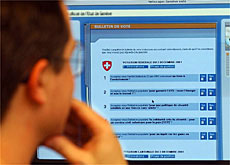
Cantons count the cost of online voting

Residents of four municipalities in canton Geneva will be able to cast their ballots online in Sunday’s nationwide votes.
But critics of the electronic voting pilot project say that it offers no real advantages and is a waste of money.
Voters in Anières, Cologny, Carouge and Meyrin will become the first in the country to be given the option to register their votes online.
Like the rest of the Swiss electorate, they are being asked to vote on whether to introduce statutory paid maternity benefit nationwide and whether to ease Switzerland’s naturalisation laws.
Officials say the system cannot be broken into by computer hackers and that the server collecting the data is located in a secure room at police headquarters in Geneva.
Those eligible to vote online have been given a tamper-proof, single-use personal identification number which they are required to use when logging on to the virtual ballot box.
All systems go
Project leader Daniel Brändli said he did not anticipate any problems with the counting of electronic votes.
“We want to test the functionality of the system and gain more experience with it,” he said.
Though previous trials in electronic voting have not led to an increase in the number of people bothering to cast their ballots, those in charge of the project say this was never their intention.
According to Brändli, the goal is to simplify the use of new technology and give more people the opportunity to exercise their political rights.
“More and more people use the internet to find information, including about politics,” said Brändli, “so it seemed logical to make it possible to vote online.”
Project promoters argue that online ballots can be useful for people – including the disabled and Swiss living abroad – who may find it difficult to make the trip to polling stations.
Scepticism
But Petra Baumberger, an e-government specialist at Bern’s Technical University, is sceptical about the future of online voting.
“Postal ballots long ago cancelled out the main advantage of voting electronically, which is to be able to vote without having to go to the polling booth,” she said.
Baumberger admits that electronic voting may temporarily swell the number of people casting ballots, but she considers the project to be a “luxury” public service.
Robert Heuss, an official from canton Basel City, says the current voting system is efficient enough and does not need to be improved.
He argues that online voting will never replace the postal ballot or polling station.
“Voting on the internet might have sex appeal, but it’s an expensive toy,” said Heuss.
Not a priority
Successful trials of online voting at a local level in canton Geneva have prompted the government to build on plans to extend the project across the country.
Internet voting experiments in Zurich and Neuchâtel are expected to follow next year.
The federal government is footing up to 80 per cent of the costs of the trial projects, which are expected to reach up to SFr7 million ($5.5 million).
The Swiss authorities are due to decide whether and how to pursue the idea of electronic voting in 2007.
But cantons which have not so far been involved in the trials have shown themselves to be less than enthusiastic about online ballots.
While canton Bern is considering the idea, officials in St Gallen, Lucerne and Graubünden have decided to wait and see how the trial projects work elsewhere.
“Right now, electronic voting seems like an expensive investment and of little real use,” said Kuno Schedler of St Gallen University’s Center of Excellence for Electronic Government.
swissinfo, based on an article previously published by NZZ
Electronic voting and voter registration is being tested in three cantons: Geneva, Neuchâtel and Zurich.
Votes have been carried out successfully at the local level four times in canton Geneva.
The government is set to decide in 2007 whether and how to roll out electronic voting across the country.

In compliance with the JTI standards
More: SWI swissinfo.ch certified by the Journalism Trust Initiative



























You can find an overview of ongoing debates with our journalists here . Please join us!
If you want to start a conversation about a topic raised in this article or want to report factual errors, email us at english@swissinfo.ch.